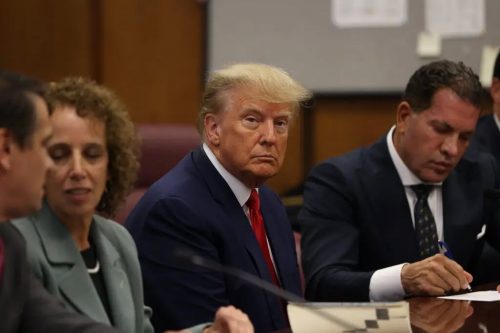

By Vy Tran
MANHATTAN, NY — As noted in TeenVogue, former President Donald Trump has been formally convicted on all 34 felony counts of business record falsification, related to hush money payments given during the 2016 presidential election to keep women from going public with testimonies of their sexual encounters with him.
Prosecutors argued that these payments undermined the 2016 election, also building a case this “sex scandal” would’ve negatively impacted his presidential campaign, as reported by N.Y. Times.
Prosecutor Joshua Steinglass argued, TeenVogue said, that Trump shouldn’t get special treatment in this case, stating that “he’s had his day in court.” He concluded with finality: “The law is the law, and it applies to everyone equally. There is no special standard for this defendant.”
If that is the case, then skeptics—such as Olayemi Olurin in a TeenVogue Opinion piece, wonder what type of precedent it can set for the rest of Americans, beyond the historical milestone of the first ex-president to be convicted guilty of a felony.
From Olurin’s op-ed, there is a growing concern of people associating the idea of felon convicts and stripped voting rights as proper punishment.
As Olurin explained, felony disenfranchisement refers to stripping people convicted of felony crimes of their right to vote, also noting it’s “a tool that America has used on a staggering number of Black people” and at least “4.6 million Americans have been disenfranchised.
“In fact,” she continued, “a 2020 report from the Sentencing Project found that 1 in 16 of all voting-age Black people in America have been stripped of their right to vote using felony disenfranchisement.”
In the concluding statement of the trial, prosecutor Steinglass emphasized Donald Trump can’t shoot somebody “during rush hour and get away with it.”
USA Today News reported the prosecutor appeared to be referring to a boast Trump made early in the 2016 presidential campaign: “I could stand in the middle of Fifth Avenue and shoot somebody, and I wouldn’t lose any voters, OK?”
Manhattan District Attorney Alvin L. Bragg, who spearheaded the prosecution against Trump, spoke at a news conference after the verdict and said, “I did my job. Our job is to follow the facts without fear or favor and that’s what we did here.”
Since then, the media continues to state a convicted felon as presidential legacy has never happened before in American history, with Bragg as the first attorney to bring a successful prosecution against the POTUS, highlighted by N.Y. Times.
“Hundreds of tweets and comments on social media” discussed how “Trump should not be allowed to vote or run for president because he’s a convicted felon,” according to TeenVogue.
However, not everyone is celebrating yet, like Olurin. “(Disenfranchisement) is one of the most cruel and consistent ways the US legal system ensures that the people most impacted have no say,” Olurin argued.
“A criminal conviction won’t mean for Donald Trump what it means for millions of poor Black and brown Americans who’ve had their rights to vote deliberately and systematically stripped away,” stated the op-ed.
“You might wish to see a tool like felony disenfranchisement weaponized against a rich, powerful, white man like Trump — to see actual consequences for an individual who has flagrantly, repeatedly acted in his own interest and caused real harm,” Olurin wrote in the Op-Ed.
Ultimately, there are advocates who question this conditional justice.
“Too many things are up in the air,” Olurin insisted, referring to what TeenVogue reporters Fortesa Latifi and Allegra Kirkland wrote: Trump’s sentencing “not happening until July. 11.”
“Just as the Donald Trumps of the world don’t usually get prosecuted or convicted, they are not usually the victims of felony disenfranchisement and it will continue that way. Even if lawmakers use this surge in enthusiasm for stripping people of their voting rights to put more draconian laws on the books or make it more difficult to challenge existing ones,” Olurin’s Op-Ed argued.